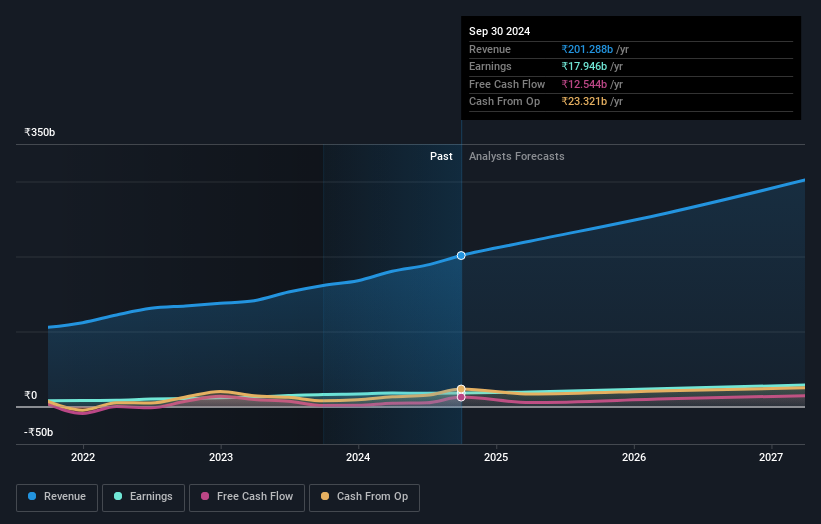- India
- /
- Electrical
- /
- NSEI:POLYCAB
With 64% ownership, Polycab India Limited (NSE:POLYCAB) insiders have a lot at stake

Key Insights
- Polycab India's significant insider ownership suggests inherent interests in company's expansion
- A total of 4 investors have a majority stake in the company with 52% ownership
- Institutions own 16% of Polycab India
If you want to know who really controls Polycab India Limited (NSE:POLYCAB), then you'll have to look at the makeup of its share registry. The group holding the most number of shares in the company, around 64% to be precise, is individual insiders. Put another way, the group faces the maximum upside potential (or downside risk).
So it follows, every decision made by insiders of Polycab India regarding the company's future would be crucial to them.
Let's take a closer look to see what the different types of shareholders can tell us about Polycab India.
View our latest analysis for Polycab India

What Does The Institutional Ownership Tell Us About Polycab India?
Many institutions measure their performance against an index that approximates the local market. So they usually pay more attention to companies that are included in major indices.
Polycab India already has institutions on the share registry. Indeed, they own a respectable stake in the company. This implies the analysts working for those institutions have looked at the stock and they like it. But just like anyone else, they could be wrong. It is not uncommon to see a big share price drop if two large institutional investors try to sell out of a stock at the same time. So it is worth checking the past earnings trajectory of Polycab India, (below). Of course, keep in mind that there are other factors to consider, too.

We note that hedge funds don't have a meaningful investment in Polycab India. The company's CEO Inder Jaisinghani is the largest shareholder with 25% of shares outstanding. Meanwhile, the second and third largest shareholders, hold 13% and 11%, of the shares outstanding, respectively.
On looking further, we found that 52% of the shares are owned by the top 4 shareholders. In other words, these shareholders have a meaningful say in the decisions of the company.
Researching institutional ownership is a good way to gauge and filter a stock's expected performance. The same can be achieved by studying analyst sentiments. There are plenty of analysts covering the stock, so it might be worth seeing what they are forecasting, too.
Insider Ownership Of Polycab India
The definition of an insider can differ slightly between different countries, but members of the board of directors always count. Company management run the business, but the CEO will answer to the board, even if he or she is a member of it.
Insider ownership is positive when it signals leadership are thinking like the true owners of the company. However, high insider ownership can also give immense power to a small group within the company. This can be negative in some circumstances.
It seems that insiders own more than half the Polycab India Limited stock. This gives them a lot of power. Insiders own ₹630b worth of shares in the ₹980b company. That's extraordinary! It is good to see this level of investment. You can check here to see if those insiders have been selling any of their shares.
General Public Ownership
With a 14% ownership, the general public, mostly comprising of individual investors, have some degree of sway over Polycab India. This size of ownership, while considerable, may not be enough to change company policy if the decision is not in sync with other large shareholders.
Private Company Ownership
It seems that Private Companies own 5.8%, of the Polycab India stock. Private companies may be related parties. Sometimes insiders have an interest in a public company through a holding in a private company, rather than in their own capacity as an individual. While it's hard to draw any broad stroke conclusions, it is worth noting as an area for further research.
Next Steps:
It's always worth thinking about the different groups who own shares in a company. But to understand Polycab India better, we need to consider many other factors.
I always like to check for a history of revenue growth. You can too, by accessing this free chart of historic revenue and earnings in this detailed graph.
If you would prefer discover what analysts are predicting in terms of future growth, do not miss this free report on analyst forecasts.
NB: Figures in this article are calculated using data from the last twelve months, which refer to the 12-month period ending on the last date of the month the financial statement is dated. This may not be consistent with full year annual report figures.
New: Manage All Your Stock Portfolios in One Place
We've created the ultimate portfolio companion for stock investors, and it's free.
• Connect an unlimited number of Portfolios and see your total in one currency
• Be alerted to new Warning Signs or Risks via email or mobile
• Track the Fair Value of your stocks
Have feedback on this article? Concerned about the content? Get in touch with us directly. Alternatively, email editorial-team (at) simplywallst.com.
This article by Simply Wall St is general in nature. We provide commentary based on historical data and analyst forecasts only using an unbiased methodology and our articles are not intended to be financial advice. It does not constitute a recommendation to buy or sell any stock, and does not take account of your objectives, or your financial situation. We aim to bring you long-term focused analysis driven by fundamental data. Note that our analysis may not factor in the latest price-sensitive company announcements or qualitative material. Simply Wall St has no position in any stocks mentioned.
About NSEI:POLYCAB
Polycab India
Manufactures and sells wires and cables under the POLYCAB brand in India and internationally.
Flawless balance sheet low.
Similar Companies
Market Insights
Community Narratives




